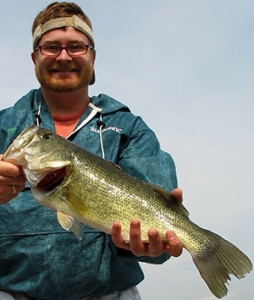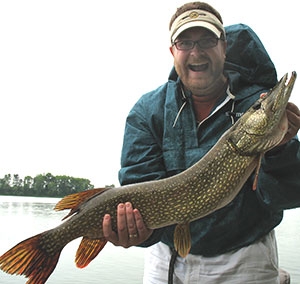by Dietz Dittrich, Mister Twister® Field Staff
 Fishing is a lot of fun, however, choosing the right lure to throw for the day can often be overwhelming. Few, if any, of us has the disposable income to buy just one of every lure, let alone a pack of them. So, here’s a few tips on colors and styles to best fit your soft plastic fishing needs.
Fishing is a lot of fun, however, choosing the right lure to throw for the day can often be overwhelming. Few, if any, of us has the disposable income to buy just one of every lure, let alone a pack of them. So, here’s a few tips on colors and styles to best fit your soft plastic fishing needs.
It may sound silly, but the first thing to decide is what you’re fishing for. It would be silly to cast a 9” Sassy Shad® if your goal for the day is to catch Crappies. “Match the hatch” is a motto that applies to more than just stream trout anglers. Once you have decided the species of fish you are after, you can narrow your search for the right lures.
 The clearer the water and the brighter the sky, the brighter your lure should be. This may seem contrary to some, but I and many pro’s, are convinced this is what works best. Natural and dark lure colors include black or June bug. Natural and brighter colors include Watermelon seed, Pumpkin Pepper, and of course, white. Colors that are good for partly cloudy days include Watermelon seed/red flake, Goby or Smoke.
The clearer the water and the brighter the sky, the brighter your lure should be. This may seem contrary to some, but I and many pro’s, are convinced this is what works best. Natural and dark lure colors include black or June bug. Natural and brighter colors include Watermelon seed, Pumpkin Pepper, and of course, white. Colors that are good for partly cloudy days include Watermelon seed/red flake, Goby or Smoke.
When fishing stained water use colors that are less natural. A couple of colors I would use in stained water on a bright day would be chartreuse, and pink. You need something bright to get the fish’s attention. On darker days, black/blue or red shad should do the trick.
Water clarity will also play a role in what shape plastic you choose as well. Again, the clearer the water, the more natural your lure color should be. Match the hatch, but keep in mind, fish living in clear water feed more by sight than a fish that lives in murky water. It is attracted by sound and vibration.
 A good example of a natural looking lure for bass is the Exude® RT Slug. This lure resembles a baitfish. However, the color of that baitfish will be different depending on which part of the country you live in. In the South, the color alewife may do a good job of looking like a small shad, however, many states do not have shad. I prefer to use Croaker Shad, which I feel looks a lot like a small sunfish. Another natural looking lures is the FAT Tube.
A good example of a natural looking lure for bass is the Exude® RT Slug. This lure resembles a baitfish. However, the color of that baitfish will be different depending on which part of the country you live in. In the South, the color alewife may do a good job of looking like a small shad, however, many states do not have shad. I prefer to use Croaker Shad, which I feel looks a lot like a small sunfish. Another natural looking lures is the FAT Tube.
 When fishing stained water you need a lure that attracts fish with sound, so use a lure that produces vibration. Most soft plastic lures will produce some vibration, however, some produce a lot more than others. Big lures move more water so they produce more vibration. Lures with Twister tails, like the Curly Tail® Grub, or paddle tails, like the Sassy Shad® will also produce additional vibration. Pay close attention to subtle differences. The Ribbon Tail, because of the length of its vibrating tail, will produce considerably more vibration than other similar products. The B-A-Hawg and Super Lizard™ also produce a lot of vibration.
When fishing stained water you need a lure that attracts fish with sound, so use a lure that produces vibration. Most soft plastic lures will produce some vibration, however, some produce a lot more than others. Big lures move more water so they produce more vibration. Lures with Twister tails, like the Curly Tail® Grub, or paddle tails, like the Sassy Shad® will also produce additional vibration. Pay close attention to subtle differences. The Ribbon Tail, because of the length of its vibrating tail, will produce considerably more vibration than other similar products. The B-A-Hawg and Super Lizard™ also produce a lot of vibration.
Finally, weather plays a large role in lure selection. Cold fronts call for a smaller, slower presentation so you should fish a lure with a smaller profile. During a cold front a fish’s metabolism slows down. It is generally not looking for a meal, but it will eat a snack. Stable weather calls for larger lures. “Big lures catch big fish.” For example, suppose you’re catching walleye on a 4” Mister Twister® Tail and a cold front moved in. Downsizing to a 3” Twister Tail could be your ticket to continued success. If the weather remains nice but you’re looking to catch bigger fish, switch to a 4” Sassy Shad® as this lure has a larger profile.
So, by paying attention to the details:
By choosing a plastic to match these conditions, you should catch more fish! Lastly, rules are meant to be broken. I have had many a day saved when I broke the rules and used a lure the fish should not have liked for the day. However, I will most always start with the basics I mentioned here. Good luck out there and have fun!